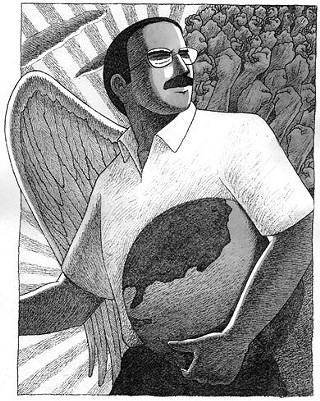Certainly, there were feminists who simply wanted to have the privileges that males had. But the very notion of acting inward on one’s own consciousness was very new for me. I had, after all, declared every such notion in the past as “bourgeois psychological horseshit.”
Despite their disparities, both the feminist movement and the left radical movement shared seriousness. They both suffered from a significant lack of humor. Everything was so serious. The left has never produced a large number of humorists. And, as for feminism, my wife had a two-year stint as a radical lesbian feminist. I found myself surrounded by women who lectured me quite seriously every time I said “oh boy” or “oh God.” I mean, Jesus Christ!
There is no question that seriousness is the opiate of the people. Heaviness—seriousness—prevents us from seeing ourselves. We can channel our unconsciousness into righteousness. I know the feeling. Seriousness is a missionary feeling. It can usually be expressed by the statement, “I’m going to tell you the truth.” It has taken me a long time to realize that every time I feel righteous I am wrongeous. It still happens despite my knowing. But, hey, we are all humans, right?
It was the lightness of Bhagwan Shree Rajneesh (later known as Osho Rajneesh) that drew me to him. Also, after a lifetime of looking outside for my answers I was ready to look inside.
Rajneesh was no sanctimonious saint. He was the most irreverent person I had ever seen or read. Whatever the belief system, he was certain to smash it. He had no theology. He had no rules of living. He peppered his discourses with the most outrageous and hilarious dirty jokes I had ever heard. He threw us all back upon ourselves. And what an agonizing relief that was.
In 1979 I glided effortlessly from being a fading Marxist to a disciple of Bhagwan Shree Rajneesh. I started wearing bright orange clothes and a necklace with the picture of the Master. Within two years I dropped my tenured position at suny and left, with my six-year-old daughter, Hira, for Poona, India. We were to be there forever.
Less than three months after we arrived, our jokester Master left for the United States. And back we came to Oregon. There I would be in charge of the school at the spiritual community of Rajneeshpuram for nine months. There I would drive a dump truck, a D-3 bulldozer, a compacter, a bus. There I would put in irrigation systems. There I would be a researcher. There I would be involved in building a city in the midst of the wilderness. There I would be among thousands of others whose connection to each other was their connection to Bhagwan Shree Rajneesh. There I would be for four years, from the beginning to the end.
“What did you get out of your experience at Rajneeshpuram?” an old radical asked a friend of mine. My friend, an Irish disciple with a flair for both truth and drama, answered, “We learned that we could live under fascism.” It was one of the truths of that experience. A group of women ran the community with an iron hand. They discouraged questioning and exercised absolute power. There was secrecy as decisions were made by a select few and honored by us all. As these few women consolidated their power they became more and more serious. We had a laughing master but the apparatchiks who ran the show lost their senses of humor.
Yet it was one of the most exciting experiences of my life. Never had I enjoyed such a feeling of love and community. Never had I been in contact with such fascinating, intelligent, and creative human beings. Never had I grown so much in such a short period of time.
To this day it is strange for me to realize that there was both the fascist reality and the reality of love and creativity in my experience at Rajneeshpuram. There are many truths. That is something that I learned at Rajneeshpuram. It is something I continue to learn. There are countless paths and not one right way.
For me, spirituality comes from inside of me. To that extent, organized spirituality is an oxymoron. Fundamentally, spirituality is anarchistic, for each of us must discover our own truth. And that cannot be found in somebody else’s discoveries. That is the difference between knowledge and knowing. What a teacher can do is to show the student what she already knows. That was my experience. As I read the discourses of Bhagwan Shree Rajneesh I felt a continual “ahah” or “I knew that” or “yes”. But it was my “ahah” and my “I knew that” and my “yes”.

















